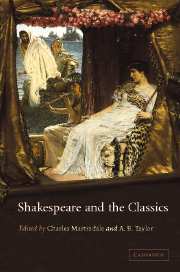Book contents
- Frontmatter
- Contents
- Notes on contributors
- List of abbreviations
- Introduction
- PART I AN INITIAL PERSPECTIVE
- PART II ‘SMALL LATINE’
- 2 Petruchio is ‘Kated’: The Taming of the Shrew and Ovid
- 3 Ovid's myths and the unsmooth course of love in A Midsummer Night's Dream
- 4 Shakespeare's learned heroines in Ovid's schoolroom
- 5 Shakespeare and Virgil
- 6 Shakespeare's reception of Plautus reconsidered
- 7 Shakespeare, Plautus, and the discovery of New Comic space
- 8 ‘Confusion now hath made his masterpiece’: Senecan resonances in Macbeth
- 9 ‘These are the only men’: Seneca and monopoly in Hamlet 2.2
- PART III ‘LESSE GREEK’
- PART IV THE RECEPTION OF SHAKESPEARE'S CLASSICISM
- Select bibliography (compiled by Joanna Paul)
- Index
5 - Shakespeare and Virgil
Published online by Cambridge University Press: 22 September 2009
- Frontmatter
- Contents
- Notes on contributors
- List of abbreviations
- Introduction
- PART I AN INITIAL PERSPECTIVE
- PART II ‘SMALL LATINE’
- 2 Petruchio is ‘Kated’: The Taming of the Shrew and Ovid
- 3 Ovid's myths and the unsmooth course of love in A Midsummer Night's Dream
- 4 Shakespeare's learned heroines in Ovid's schoolroom
- 5 Shakespeare and Virgil
- 6 Shakespeare's reception of Plautus reconsidered
- 7 Shakespeare, Plautus, and the discovery of New Comic space
- 8 ‘Confusion now hath made his masterpiece’: Senecan resonances in Macbeth
- 9 ‘These are the only men’: Seneca and monopoly in Hamlet 2.2
- PART III ‘LESSE GREEK’
- PART IV THE RECEPTION OF SHAKESPEARE'S CLASSICISM
- Select bibliography (compiled by Joanna Paul)
- Index
Summary
J. W. Velz's claim that a full study of Virgil and Shakespeare is a key desideratum is … misplaced; we at least would rather be spared it.
This interdiction, overly dogmatic and itself perhaps misplaced, sprang from an irritation with the excesses and lack of rigour of much current source-hunting. Leonard Digges' assertion ‘look thorough / This whole book, thou shalt find he doth not borrow / One phrase from Greeks, nor Latins imitate’, even if we regard it as false or misleading, must at least have seemed plausible to many of Shakespeare's early readers (Dr Johnson later made a not dissimilar claim). Still, there can be no reasonable doubt that Shakespeare read some Virgil in Latin at school, and that allusions and references to Virgil are found throughout his work. No one has undermined the demonstration by Root, made more than a century ago, that Shakespeare's classical mythology derives primarily from Ovid and Virgil, Ovid's influence being four times greater than Virgil's. The main focus of Shakespeare's interest in Virgil was in three episodes from the Aeneid, the tragedy of Dido, the sack of Troy, and Aeneas' visit to the Underworld (episodes that have been favourites throughout history, from St Augustine in his Confessions onwards). Whether Shakespeare read the second half of the poem, either in Latin or in the translation of Phaer and Twyne (1584), cannot be proved, though it is likely enough.
- Type
- Chapter
- Information
- Shakespeare and the Classics , pp. 87 - 106Publisher: Cambridge University PressPrint publication year: 2004
- 3
- Cited by

